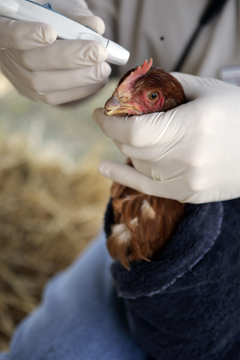Swimming pools are ideal mosquito homes
The real estate tumble has produced its share of troubles:
unmown lawns, boarded up homes, vandalism and plummeting
prices.
Add mosquitoes to the list.
Swimming pools are ideal mosquito homes
The real estate tumble has produced its share of troubles: unmown lawns, boarded up homes, vandalism and plummeting prices.
Add mosquitoes to the list.
With the sudden onset of warmer weather, mosquitoes are boiling out of disused backyard pools that have become stagnant, green swamps – perfect breeding grounds for the tiny parasites.
“I’m working on about 12 sites now,” said Sean Miller, a vector control specialist for San Benito County. “With all the foreclosures, there are probably about 80 more in town.”
A “vector” is any pest that may transmit disease to humans or other animals. Miller, a trained entomologist, does not just chase mosquitoes. Rats, cockroaches, bats and even invasive non-native plants are all in a day’s work.
But battling mosquitoes is a high priority task, in part because of the spread of west Nile virus to California and the potential for a mosquito-borne encephalitis outbreak.
Mosquitoes need a meal of blood to nourish their eggs, which are either laid in standing water or in damp ground. The diminutive vampires are an ideal vehicle for the spread of disease. A bit of blood removed from an infected host can move to a new location as the mosquito flies away, only to infect a new one when the bug taps a new host.
There are many species of mosquitoes, some more likely to spread disease than others.
Part of Miller’s job is to identify which species are present in a certain area.
“When we know what we’ve found, we know where to look to control them,” he said. Some prefer small pools like those that might be found in rain gutters. Others breed in damp pastures. Those that he worries most about are the ones breeding in stagnant water, the places where pathogens might be. Places like murky pools.
Miller talked about the emerging problem of abandoned pools one morning this week, as he drove to a farm north of Hollister.
There, a flock of 10 Rhode Island red hens strut around a pretty posh coop. The birds are canaries in the disease coal mine.
Once every two weeks, Miller and another staff member take a droplet of blood from the comb creasing each hen’s head. The blood is checked for disease.
Nearby, a trap using a lump of dry ice as an attractant (mosquitoes locate hosts by flying toward clouds of carbon dioxide, the stuff dry ice is made of), a trap hums with mosquitoes trapped overnight.
The monitoring site was carefully selected.
“This site historically has a lot of mosquito activity,” Miller said. “We get a lot of irrigated pasture mosquitoes. It’s just a good site to get fairly regular action.”
Miller prefers that the location of the site not be disclosed. Even though the birds are obviously well cared for – sleek and heavy with feed – he fears that animal rights activists might interfere with his work. His fears are not baseless. Monitoring flocks elsewhere have been released by vandals.
Miller is passionate about his work and not just because of his lifelong passion for bugs. Last year, a mosquito or tick was probably responsible for an illness that put him in bed for a month.
The latest battlefront is around swimming pools. Pools that are being cared for are not a problem. But as chlorine or other pool chemicals evaporate, the stagnant water in an ignored pool offers a perfect home for mosquitoes.
West Nile virus spread across the country in a few years, not because mosquitoes are marathon flyers – they usually never get very far from their place of birth – but because of another host. Birds get west Nile just as people can. If a mosquito bites an infected bird, it can then infect humans.
The challenge Miller faces in pools is deeper than just finding them. Because they are on private property, he needs to ask before he can act.
“We have to get their permission to pump or treat it, and for that we need an abatement permit,” he said.
Even finding a property owner once a home has been foreclosed upon can be difficult, but so far, Miller said people have been cooperative.
With good reason.
Once permission is given, Miller treats pools with Bacillus thurigensis, a bacteria that will kill mosquito larvae. Then, property owners have 30 days to drain the pool before he comes knocking again.
If the problem is not addressed within a month, owners are subject to fines of as much as $1,000 a day. So far, that has not happened, thanks to good cooperation, he said.
To find “green pools,” Miller is asking the help of local residents. People who are aware of a potential problem can call county Vector Control at 637-5344, ext. 23.
Miller also asks people who find bird corpses that appear to have died of natural causes to contact the state Department of Public Health for west Nile testing. Birds should not have any obvious signs of trauma, like bite marks or bullet holes. They should be fresh and in one piece. People reporting a bird need not touch it. They are asked instead to call 877-968-2473.
The campaign, funded in the northern part of the county through a special district after west Nile made it to the area, takes some strange turns.
Miller will soon be seen touring the area on an ATV equipped with a flashing light bar. Over about two weeks, he’ll be dropping briquette-sized blocks of bacillus thurigensis into every storm grate in Hollister, San Juan Bautista and Aromas.









